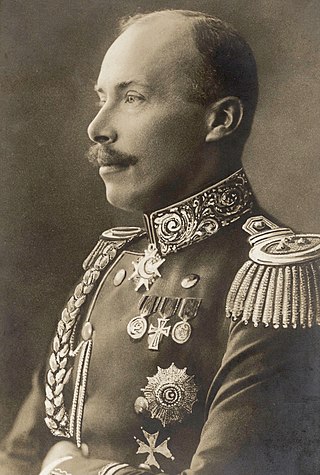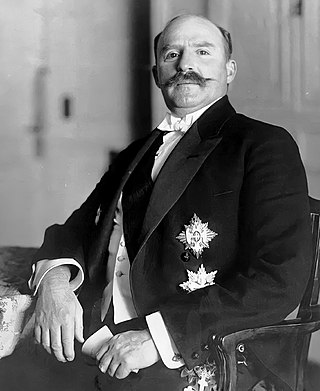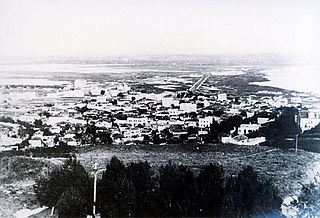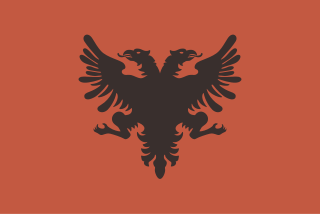
Wilhelm, Prince of Albania, reigned briefly as sovereign of the Principality of Albania from 7 March to 3 September 1914, when he left for exile. His reign officially came to an end on 31 January 1925, when the country was declared an Albanian Republic.

Essad Pasha Toptani was an Ottoman army officer who served as the Albanian deputy in the Ottoman Parliament. He was a prominent politician in early 20th-century Albania. Toptani cooperated with the Balkan League after the Balkan Wars and established a state in central Albania, based in Durrës, called the Republic of Central Albania.

The Principality of Albania refers to the short-lived monarchy in Albania, headed by Wilhelm, Prince of Albania, that lasted from the Treaty of London of 1913 which ended the First Balkan War, through the invasions of Albania during World War I and the subsequent disputes over Albanian independence during the Paris Peace Conference of 1919, until 1925, when the monarchy was abolished and the Albanian Republic declared.

Fejzi Bey Alizoti was an Ottoman and later Albanian politician who served as the Chairman of the Central Administration of Albania from January 1916 to October 1918. He never held the title "prime minister" as is commonly misconceived.
Abaz Dilaver Çelkupa or Abaz Efendi Çelkupa was an Albanian politician and one of the delegates and signatories of the Albanian Declaration of Independence in 1912. He was among the key activists of the Albanian National Awakening.

Sami Bey Vrioni (1876–1947) was an Albanian politician, diplomat, and a delegate at the Assembly of Vlora which declared the Albanian Declaration of Independence. He was a respected and powerful landowner in the Fier region of Albania.

The Republic of Central Albania was a short-lived unrecognised state established on 16 October 1913, with its administrative centre in Durrës, today in Albania.

Prenk Bib Doda, also known as Prênk Pasha, was an Albanian member of the Young Turks, prince of Mirdita, and politician in the Principality of Albania.

The International Gendarmerie was the first law enforcement agency of the Principality of Albania. It was established by the decision of the ambassadors of the six Great Powers that participated in the London Peace Conference. This decision was made on the basis of the London Treaty signed on May 30, 1913. Since most of the members were from the Netherlands, this force was also known as the Dutch Military Mission.

The Treaty of Serbian–Albanian Alliance, also known as the Treaty of Niš, was a secret treaty signed in Niš between Essad Pasha Toptani and prime minister Nikola Pašić of Kingdom of Serbia on 17 September 1914.
Mustafa Ndroqi(born Mustafa Mancaku) was an Albanian landowner who played an important role in the Revolts of 1914–15.

The Congress of Durrës was a conference of Albanian political leaders, held from December 25 to December 27, 1918, in Durrës, at the time capital of the Principality of Albania.

The Royal Palace of Durrës, sometimes known as the Konak of Durrës, was a royal palace of the Principality of Albania situated in Durrës, Albania. It previously served as the chief official residence of Wilhelm, Prince of Albania, and his wife, Princess Sophie of Schönburg-Waldenburg. It has been used by different Albanian governments for various purposes.

Independent Albania was a parliamentary state declared in Vlorë on 28 November 1912 during the First Balkan War. Its assembly was constituted on the same day while its government and senate were established on 4 December 1912.

Haxhi Qamili, born Qamil Zyber Xhameta, was the leader of the 1914–15 revolt in Albania. He was popularly known by his religious name Haxhi Qamili, though he was also known as Baba Qamili.

Aqif Pasha Biçaku mostly known as Aqif Pashë Elbasani was an Ottoman Albanian political figure in the Sanjak of Elbasan and after the Young Turk Revolution became an activist for the Albanian national cause.

Mihal Turtulli, also known as Michal Tourtoulis or Dr. Turtulli, was an Albanian oculist, politician, member of the High Council of State, and representative of Albania at the Paris Peace Conference of 1919.
Musa Qazimi was an Albanian teacher, mufti, politician, and Turcophile rebel leader. He was first the mayor (1904-1908), then the mufti (1908-1913), and finally the prefect of Tirana (1913-1914). In the turbulent period after the Albanian declaration of independence from the Ottoman Empire, he was first a supporter of the Young Turks, then of Essad Pasha. After he broke with Essad Pasha, he defected and became a leader in the sectarian, reactionary and clerically-tinged pro-Ottoman revolt against the new Albanian state's authorities. While the official head of the movement was Haxhi Qamili and the head of its armed forces was Mustafa Ndroqi, Qazimi has been considered to be the ideological inspiration of the movement., and the "real leader" of the uprising. After the revolt was shattered by a makeshift alliance consisting of Mirdita Catholics, local resistance, Kosovar Albanians led by Isa Boletini and some foreign volunteers mainly from Romania, he was found guilty of orchestrating the slaughter that occurred during his revolt against supporters of the Albanian national movement as well as Bektashis and Christians, and he was executed on July 7, 1915.
Arif Hiqmeti, born Arif Neziri (1870s–1916), was one of the leaders of the Peasant Revolt in Albania.
Haxhi Isuf Banka (Zhelegu) (1864 – September 1, 1944) was an Albanian economist and politician who served as Minister of Finances in the Toptani Government.




















